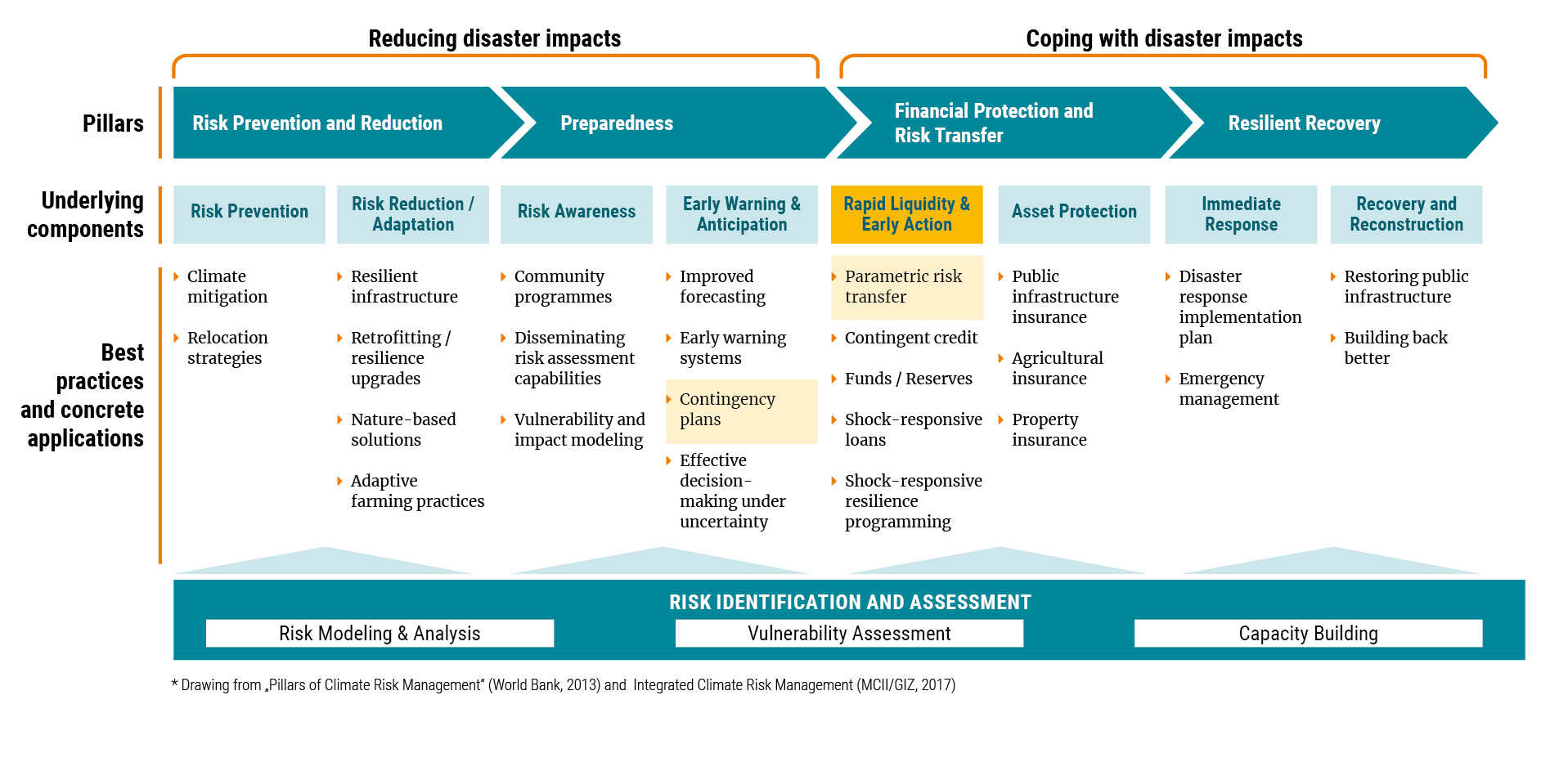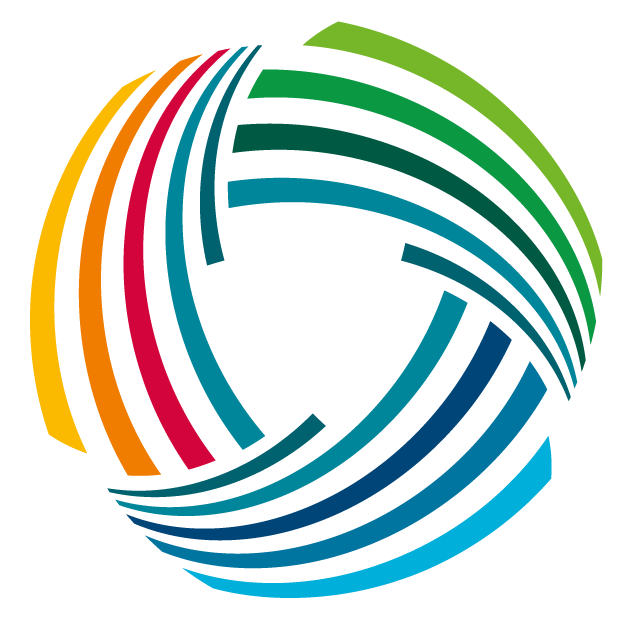Workstream 2: Action & Implementation
Enable effective action and implementation of high-quality Climate and Disaster Risk Finance and Insurance solutions in poor and vulnerable countries
KfW & Replica Partners - ARC Replica Insurance for Good: Protecting People at Risk of Drought in Africa
By the KfW Development Bank, World Food Programme & Start Network
ARC Replica is an innovative risk-financing solution offered to the World Food Programme (WFP) and Start Network (the two ‘Replica Partners’) by the African Risk Capacity (ARC).
This partnership results in both increased availability of disaster risk finance through sovereign insurance mechanisms and greater collaboration on disaster risk management between the Replica Partner and the Government of participating ARC member states.
The Replica partners purchase “Replica” policies that ensure a greater number of vulnerable people receive ex-ante assistance when extreme droughts in covered countries trigger insurance pay-outs. The policy also provides the collaborating governments with technical assistance for improving and customizing parametric drought models, contingency planning, monitoring seasonal risk, and other capacity development needs identified through the partnership.
Background
ARC Replica is a programme that has been rolled out across six countries to date: five in West Africa and one in Southern Africa (Burkina Faso, The Gambia, Mali, Mauritania, Senegal and Zimbabwe).
On the African continent, the Sahel region and the Southern African region face multiple complex and interrelated challenges, including high levels of food insecurity and malnutrition, environmental degradation and climate-related shocks, safety concerns and political instability. Over four million people in the Sahel are food insecure and high levels of chronic and acute malnutrition are present in the region. Approximately 80% of the land area in the region is estimated to be degraded. The Sahel faces recurrent droughts and erratic rainfall patterns. Droughts happen every three years and a major drought occurs every five to ten years¹. Climate change acts as a risk multiplier and worsens existing challenges in the region. Supporting governments and communities in their efforts to build resilience and cope with the impacts of climate change is essential for promoting peace, security and food security in the region.
Southern Africa is likewise frequently impacted by drought conditions. In particular, Zimbabwe is grappling with an ongoing economic crisis which compounds the impacts of drought events.
Drought response is typically provided by humanitarian organizations through ad-hoc and ex-post donor financing, which is increasingly scarce as country budgets become even more stretched. The complex and interconnected challenges faced by ARC Replica countries require integrated and layered approaches, with predictable and multi-year funding being fundamental for the implementation of long-term transformational programmes. ARC Replica is one element in a holistic risk management approach that can be adopted by African countries.
¹ WFP. 2018. Scaling-up for resilient individuals, communities, and systems in the Sahel.
Project description
The African Union’s African Risk Capacity (ARC) is an innovative risk management and resilience-building institution that helps African Union Member States manage climate and disaster risk and adapt to climate change. ARC aims to improve risk management in African countries through earlier, more predictable and more coordinated action. ARC Member States purchase insurance policies that can trigger pay-outs to finance implementation of pre-approved contingency plans. ARC Replica coverage is an insurance product offered by ARC Ltd to the Replica Partners to complement the insurance policies purchased by sovereign African states (currently Burkina Faso, The Gambia, Mali, Mauritania, Senegal and Zimbabwe²). Replica partners can increase the ARC insurance coverage of eligible ARC Member States by purchasing a ‘Replica Policy’.
The main goal of ARC Replica is to strengthen climate risk management practices of African states through implementing ex-ante humanitarian risk financing approaches. The programme is based on the concept of humanitarian actors working alongside local government to purchase insurance policies and use the eventual pay-out to put in place actions that reduce the impacts of drought on food security.
Key achievements in 2020 include:
- Five Replica insurance policies purchased by WFP, providing cover to 1.2 million vulnerable people
- Three pay-outs triggered from 2019/20 policies, providing early assistance to 200,000 people in Senegal through a Start Network purchased policy, and 4,000 people in Mauritania and 40,000 people in Zimbabwe through WFP purchased policies.
- Learning exercise underway in countries that received payouts to gather evidence on responding earlier to drought
- Development of a concept for Phase II of the ARC Replica initiative, called ARC Replica Plus, which will aim to place ARC and ARC Replica within a broader climate risk management framework through the use of a sub-insurance risk layer (ex. trigger-based contingency fund).
² Burkina Faso, The Gambia, Mali, Mauritania and Zimbabwe led by WFP; Senegal led by the Start Network
Covid-19 impact and response
The Covid-19 pandemic is exacerbating the impacts of drought by depressing local crop yields and this causes people to rely more on the markets to access food. As a result, the economic impacts of Covid-19 will be felt deeply by countries in Africa that are experiencing drought. ARC Replica coverage supports ‘double resilience’ of vulnerable people, protecting them from both food insecurity and the compound impacts of Covid-19 on market access.
Covid-19 has also impacted responses financed through payouts of ARC Replica, which were triggered for the 2019/20 policies in Senegal, Mauritania and Zimbabwe:
In Senegal, three rounds of cash transfers and enriched flour distributions were planned alongside sensitization activities on hygiene and nutrition between March and September 2020. However, distributions were delayed due to lockdown measures and they started one month later. Start Network Members had completed targeting (geographical, followed by community targeting) in February and utilized this one-month delay to develop a Covid-19 guideline and train teams to ensure strict compliance with public health and sanitary measures during distribution. Activities were carried out after assessing the risk of disease transmission and securing exceptional travel authorizations from the government. In some cases, the second and third distributions were combined to compensate for the delay in the initial disbursement. In fact, Start Network Members had planned to conduct sensitization activities relating to hygiene and nutrition as part of the intervention.
This was approved in November 2019 before the Covid-19 outbreak and it turned out to be a significant advantage because the measures facilitated the addition of messaging related to Covid-19 prevention without any need for additional approvals and therefore avoided yet further delays.
In Mauritania, delivery of cash-based transfers was delayed by one month, due to a national lockdown imposed by the government with the aim of containing the virus. As a result, targeting had to be carried out remotely using an adapted methodology. When implementation finally became possible, beneficiaries were given both their disbursements in one lump sum so as to reduce the frequency of contact and stifle the spread of the virus. Beneficiaries highlighted in a post-distribution monitoring questionnaire that they preferred to receive the transfers for two months in one lump sum, since this enabled them improve planning. In addition, Covid-19 sensitization information was provided to beneficiaries during the distributions.
A market assessment was undertaken in Zimbabwe based on the contingency plans to determine the most appropriate form of assistance. In light of the country’s economic situation, in-kind food assistance was appraised as the most appropriate modality and it was delivered at the beginning of October to approximately 40,000 people. Assistance was originally planned for early September but delays in market assessment and procurement due to Covid-19 restrictions caused a time lag.
Success Story
A visit by ARC Agency to a site where Start Network implemented the Senegal pay-out, with Plan International as one of the six implementing members:

By loading the video, you agree to YouTube's privacy policy.
Learn more
Summary Table
Overview | |
|---|---|
Risk(s) to be covered | Drought |
Product/Solution | Index-based macroinsurance |
Objective | Improving the drought risk insurance product offered by ARC in six countries while supporting capacity development of government and other relevant stakeholders in the country on disaster risk financing and insurance. ARC Replica also increases the amount of coverage available for vulnerable populations in Africa, through Replica policies that complement government policies. The close relationship between Replica partners and governments through the ARC policy design and preparation process also facilitates better coordination in drought response, should a pay-out be triggered, through contingency planning activities. |
Beneficiaries | The most vulnerable people impacted by the drought. In 2020 approximately 1.3 million people were covered by ARC Replica policies purchased by WFP. In 2020, payouts from the 2019/20 policies allowed Start Network to assist 200,000 people in Senegal and WFP to assist approximately 4000 people in Mauritania and 40,000 people in Zimbabwe ahead of the traditional lean season response. |
InsuResilience Global Partnership Members and their partner organizations/governments | WFP and Start Network lead this programme, in collaboration with ARC Agency, ARC Limited and the governments of Burkina Faso, the Gambia, Mali, Mauritania and Zimbabwe (WFP) and Senegal (Start Network, which in Senegal comprises of Oxfam, Action against Hunger, Plan International, Save the Children, Catholic Relief Services and World Vision). |
Climate and Disaster Risk Management
Placement of this project along the climate and disaster risk continuum:

